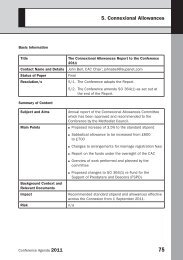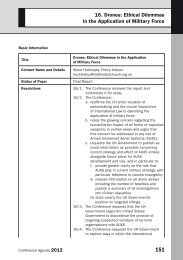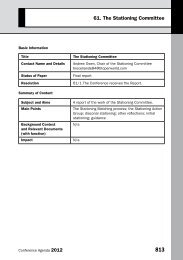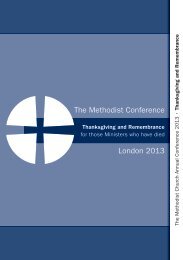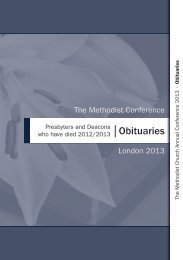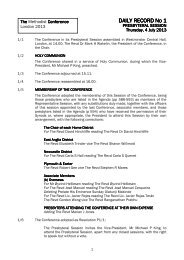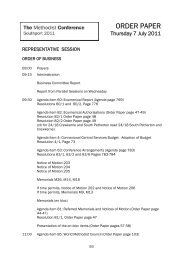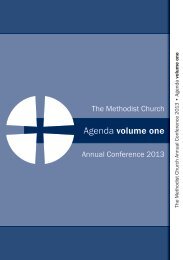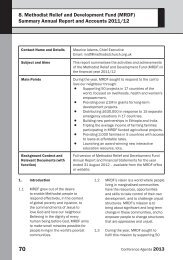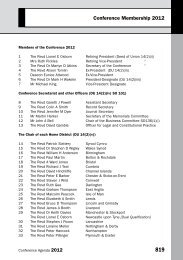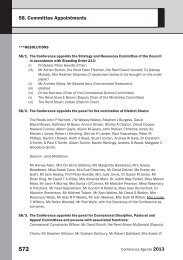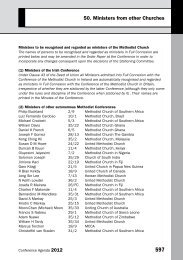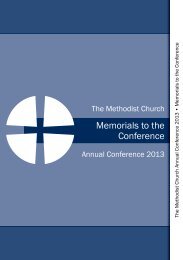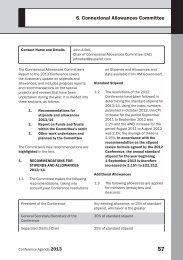Agenda Volume 3 - Methodist Conference
Agenda Volume 3 - Methodist Conference
Agenda Volume 3 - Methodist Conference
You also want an ePaper? Increase the reach of your titles
YUMPU automatically turns print PDFs into web optimized ePapers that Google loves.
57. The Fruitful Field Project<br />
fundamental rhythms of prayer and<br />
study and common life which remain<br />
central to our understanding and<br />
practice of Christian formation.”<br />
200.3 A centre (through its structures,<br />
resources and partnerships) should be<br />
able to connect with partners across<br />
the World Church. A connexional<br />
committee, in its submission made<br />
during the consultation period,<br />
challenged the Connexion “to raise<br />
its eyes beyond the traditional and<br />
historic boundaries of learning<br />
provision and to incorporate a<br />
broader world-view. We also challenge<br />
the Connexion to engender a culture<br />
of learning which is outward-facing,<br />
world-engaged and global in its<br />
understanding of participation in<br />
God’s mission. We challenge the<br />
Connexion to develop an expression<br />
of discipleship which expands<br />
horizons and embraces the wideranging<br />
perspectives of our World<br />
Church partners.” As a submission<br />
from a learning institution noted,<br />
“we need an institution in the UK<br />
that helps the world wide family of<br />
<strong>Methodist</strong>s to be shaped together<br />
for mission, to learn with and from<br />
each other, to be a partner with other<br />
institutions [across the World Church]<br />
to build their capacity and to receive<br />
their wisdom and insights.”<br />
200.4 A centre (through its structures,<br />
resources and partnerships) should<br />
be able to allow deep sharing with<br />
ecumenical partners. As a tutor<br />
noted in their submission made<br />
during the consultation period, “there<br />
is a richness to be derived from<br />
training in community with partner<br />
denominations and this requires<br />
students to sit together and learn<br />
together.” Directing us towards a wide<br />
understanding of the role of centres<br />
in the context of ecumenical working,<br />
a postholder in a partner organisation<br />
noted that “my observation is<br />
that [newer denominations and]<br />
churches in particular, look to the<br />
historic churches as possessors of<br />
theological and educational resources<br />
which they do not have, and are<br />
eager to develop relationships so<br />
that those resources can be shared...<br />
In other words part of the synergy<br />
is what the historic churches have<br />
and can bring to the table.” As a<br />
partner organisation noted, “in a<br />
post-denominational future we... see<br />
the increasing need for institutions<br />
in good standing across the wider<br />
Church, offering training with a rich<br />
ecumenical mix, whilst at the same<br />
time offering <strong>Methodist</strong> charisms as a<br />
gift to the Church universal.”<br />
200.5 A centre (through its structures,<br />
resources and partnerships)<br />
should be able to nurture apt<br />
and excellent scholarship and<br />
research, in partnership with the<br />
Higher Education sector. As a tutor<br />
noted in their submission made<br />
during the consultation period,<br />
“the <strong>Methodist</strong> Church needs a<br />
university validated institution<br />
where some of the core areas of<br />
Methodism can be academically<br />
researched and studied. This is to<br />
provide accessible scholarship to<br />
<strong>Conference</strong> <strong>Agenda</strong> 2012 725



